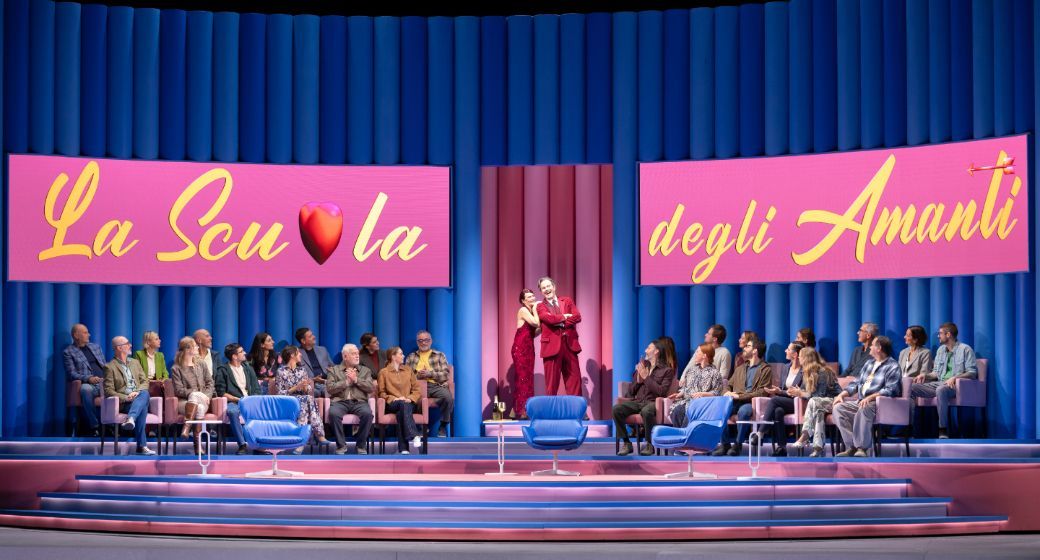Mozart's Così fan tutte functions less as a conventional drama and more as a philosophical treatise set to music, deeply informed by the cynical rationality of the Enlightenment. The plot (a contrived wager testing feminine fidelity) deliberately forgoes realism, challenging the audience to abandon any demand for a credible narrative. Consequently, the opera's appeal stems not from emotional connection but from intellectual and aesthetic appreciation; it is a brilliant, heartless game. The true enjoyment of Così lies in admiring its exquisite formal symmetry: the intricate ensembles, mirrored entrances and exits, and the masterful manipulation of its characters, whom the opera pointedly denies any genuine psychological depth. We are invited not to feel for them, but to admire the cold perfection of the mechanism in which they are merely cogs.

Given this premise, it is perhaps unsurprising that director Robert Carsen, in his first staging of the work, finds a parallel in the world of reality television. In his La Scala production, the two couples are contestants on a show titled “La scuola degli amanti” (the opera's subtitle), with the manipulative duo Don Alfonso and Despina orchestrating the fidelity test. A rotating platform reveals a garishly decorated, early-2000s TV studio with live audience, and, as it turns, it shows the different rooms of the house where the contestants live. This setting fits the story remarkably well, a testament to Carsen's expertise and profound understanding of theatrical space and dramatic action. The result is an extremely entertaining production that, without distorting the plot, successfully maintains the spirit of the characters.
This modern setting, however, necessarily dispenses with the 18th-century aesthetics that form the natural habitat for a philosopher like Don Alfonso, a role that carries a very different weight and significance when recast as a mere TV host. Furthermore, the opera's original pacing is tuned to a world of aristocratic leisure. To convincingly transplant it into the frantic 21st century, Carsen fills the stage with a bustling crowd of actors – other contestants, cameramen, waiters. The most remarkable technical achievement is the silence of this multitude; through careful choice of footwear and sound-absorbing stage coverings, Carsen ensures their movements are virtually noiseless, even during energetic dance sequences.
The most significant flaw in this otherwise intelligent and highly enjoyable production is the sheer number of musical cuts, primarily in the recitatives. These cuts are deemed necessary to fit the Carsen's concept and to streamline the runtime, yet the practice of cutting music to serve a directorial vision is a dangerous and intellectually questionable compromise. This is particularly disappointing in the excision of Ferrando's beautiful aria, “Ah, lo vedo, quest'anima bella”, a personal favourite.
In the pit, Alexander Soddy led the La Scala orchestra with notable spark and lightness, maintaining a fast and exciting pace that perfectly suited the production. He drew a wonderfully versatile sound from the ensemble: fluffy and delicate when required (the strings in “Soave sia il vento” formed a soft, marvellous cloud of legato) and spiritedly whirling to embody the characters' most intense emotions. Throughout, Soddy proved to be a supremely careful accompanist, never overpowering the singers.
Elsa Dreisig delivered a compelling Fiordiligi, her soprano distinguished by brilliant, metallic high notes and beautiful coloratura. While she navigated the hurdles of “Come scoglio” with some difficulty in the lower register, her performance remained engaging, grounded in a rock-solid technique and an exciting upper register. She was at her best in “Per pietà”, where her seamless legato line revealed profound dramatic depth and emotional vulnerability.
As Dorabella, Nina van Essen possessed a velvety, honeyed mezzo-soprano, arguably the most beautiful voice of the evening. Her high register was both confident and powerful, and her acting captured the mischievous joy of her bubbly, youthful character with irresistible charm.
Giovanni Sala, as Ferrando, displayed a light tenor capable of heroic outbursts, although his voice occasionally seemed slightly small for the large theatre. A singer with a true Mozartian style, his phrasing was exceptionally refined. He delivered a delicate and dreamy “Un'aura amorosa”, while his “Tradito, schernito”, sung from the ‘confession room’, was powerfully convincing.
Guglielmo was Luca Micheletti, a La Scala favourite, whose engaging and witty interpretation was supported by an elegant, well-placed baritone. Gerald Finley brought his elegant bass-baritone and deep commitment to the role of Don Alfonso, even physically resembling the game-show hosts of the era. As Despina, Sandrine Piau demonstrated that while her soprano may have lost some of its projection in the middle register, her technique and vocal emission remain impeccable, her high notes brilliantly secure and her acting as committed and sparkling as ever.


